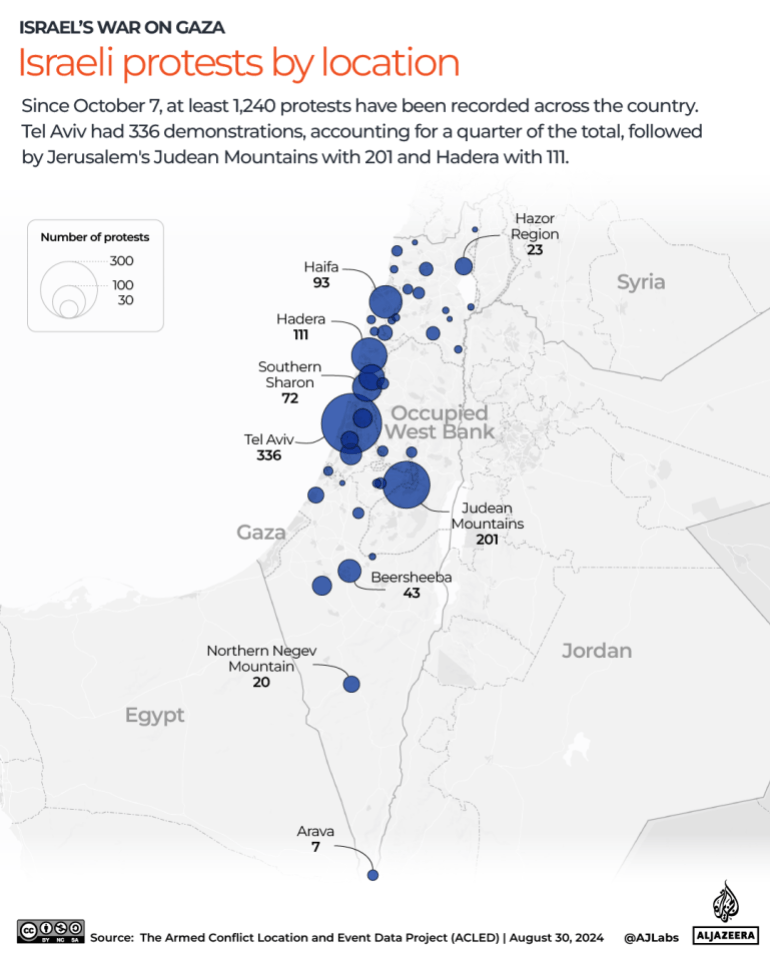Frustration spills over as thousands of Israelis protest government’s failure to secure the release of captives in Gaza.
An estimated 750,000 Israelis have taken to the streets in one of Israel’s biggest-ever protests as they demanded that the government of Prime Minister Benjamin Netanyahu strike a deal to free remaining captives in Gaza.
The record number of demonstrators comes a week after the Israeli Army announced it had recovered the bodies of six captives from a tunnel in southern Gaza.
Family members of Israeli captives and groups representing them blame Israeli Prime Minister Netanyahu and his government for failing to secure a truce deal that would secure their release.
More than 100 captives still remain in Gaza, but about one-third of them are believed to be dead, according to the Israeli military. A total of 105 captives were released by Hamas in exchange for 240 Palestinian prisoners held in Israeli prisons as part of a deal in November.
The Palestinians fighters led by Hamas took about 240 people captive in the wake of attack in southern Israel on October 7. At least 1,139 people were killed in the attack.
Since then Israel has killed more than 40,000 Palestinians in Gaza and destroyed vast swaths of the coastal enclave in a campaign that has caused global condemnation. Israel has also killed more than 600 people in the occupied West Bank and detained nearly 10,000 Palestinians.
Record number of protesters
Organisers say 500,000 people attended rallies in Tel Aviv, and 250,000 others joined rallies in towns elsewhere in the country.
Al Jazeera’s Hamdah Salhut reporting from Amman, Jordan, because the channel has been banned from Israel by the government, said most demonstrators say they will continue to protest until the government hears their demands and changes its policy.
“The consecutive demonstrations over the last week saw unprecedented crowds, but Netanyahu maintains that military pressure is still the main way to bring the remaining captives back home, and a deal to bring about their release is still nowhere in sight,” Salhut reported.
Danielle Aloni, a released captive, spoke at the rally in Tel Aviv on Saturday night and said, “Mr Prime Minister, a few days ago, in front of the families of the captives and said, sorry that we’re not able to bring them back alive. But what kind of forgiveness is that if you do not intend to change your ways?” before adding, “We will not forgive”.
Libby Lenkinski, vice president for public engagement at the New Israel Fund, says that increasing numbers of Israelis recognise that a lasting ceasefire is the only way that can be achieved.
According to data from the Armed Conflict Location and Event Data Project (ACLED), there have been an average of 113 protests across Israel per month since October last year.

“There were groups of protesters calling for a ceasefire as early as November and December [last year], and I think that number has been growing in a pretty steady way,” Lenkinski told Al Jazeera in an interview from New York.
She said the number of protesters had “grown pretty dramatically in the past week”, with an increasing number of Israelis protesting now understanding that a ceasefire is actually the only way that the captives will return to Israel.
“I think that’s now a pretty common understanding among protesters. You do see a rising number of Israelis wanting this to end whether they are in the streets or not,” she said.